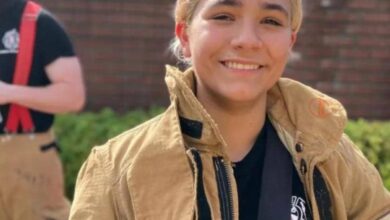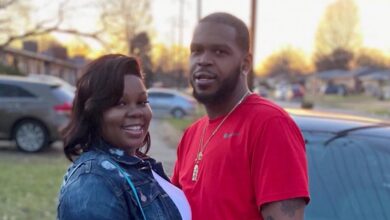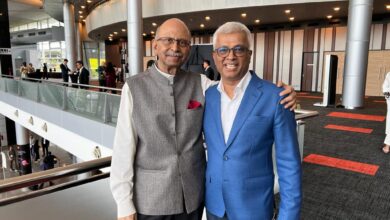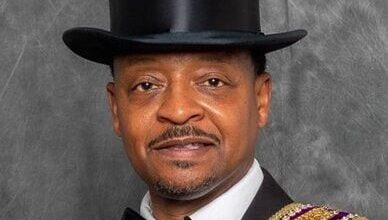‘I love being a Black woman business owner’
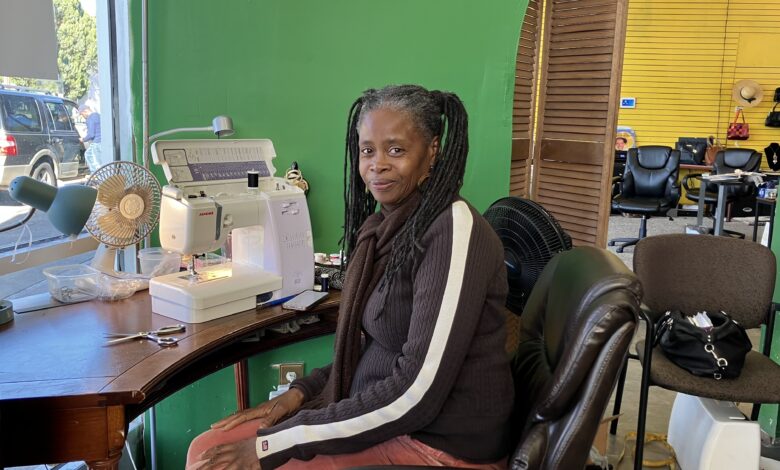
Every Friday night in the early 70s, one could find Theuda Nmosa Tusajiwe and a friend dancing with big afro puffs in handmade bell bottoms, crop tops with bell sleeves, halter necks, “hip huggers and elephant leg flare pants.”
Today, Tusajiwe, owner of Nmosa Designs and Fabrics in Woodlawn, sits at a desk, her sewing machine humming. She’s wearing pink corduroy flared pants. A pair of pink-rimmed eyeglasses perch on the tip of her nose. Her long locs are tied into pigtails and hang far past her dangling, tortoise shell hoop earrings.
“I started sewing when I was 16. Which I love with every fiber of my being, I love sewing more than anything,” Tusajiwe said. “Everytime we walked into the club, people just waited to see what we had on. It was so exciting. That’s when I started sewing. I fell in love with it out of a need because I could never, ever find anything for me in the stores that was long enough or stylish enough.”
Tusejiwe has made a home in Birmingham, but she said the city was very slow to grow, especially for the Black community.
“I’ve moved in and out of Birmingham so many times, waiting for something to happen in this city, and it just took a very long time,” she said.
According to a recent Brookings Institution study, Black women owned more than 19% of all women-owned businesses in the U.S. in 2017, higher than their proportion in the population. However, representation lags in the Birmingham metro, according to a report from Prosper, a Birmingham non-profit that helps grow Black owned businesses.
“One of the ways that we lagged behind in Birmingham is not just in the number of black owned businesses, but the number of black owned businesses that have more than one employee relative to the size of our population,” J.W. Carpenter, president of Prosper, said.
He said Prosper is working to ensure Birmingham’s Black business owners have opportunities to get contracts for new employees, connections to funders and educational opportunities to grow their businesses.
“The only shot we’ve got to be the most inclusive and thriving economy in the southeast is if all of our residents and business owners have opportunities to grow. And so that’s something based on the Brookings data we saw that we were behind and that’s why we’re laser focused on making sure that those Black owned businesses have those opportunities,” Carpenter said.
Former president of the Woodlawn Neighborhood Association, Valencia King, said the neighborhood has been becoming a more diverse and inclusive space.
“The growth of the minority and Black owned businesses, you have to look at what used to be the history of our community. Our community was not always accepting of African American people. The growth of their businesses and them coming back and reviving Woodlawn is wonderful,” King said.
Originally, Tusajiwe grew up in Sipsey, a small town in Walker County.
“Fashion, style, outlet stores, we were far removed from everything. We didn’t have any fashion sense in that community, but my girl friend and I were very fashionable. We were just not satisfied with the ordinary,” she said.
She changed her name 28 years ago from Linda Annette Sims. She said her name was “too country.” Theuda Nmosa Tusajiwe, derived from Swahili, means benevolent and charitable, sharing and giving, blessed by God.
“I changed my name because it fits who I am. It describes who I am as a person. African names describe your character or what you strive to be, things you want to develop in your character.
Tusajiwe and her friend started sewing and making clothing at the kitchen table of the only person in their community that knew how to sew.
Eventually they saved enough money to buy their own sewing machine. They frequented the only fabric store in the community and made new outfits to go dancing.
After graduating from high school, Tusajiwe went into the military. She continued sewing and even hosted fashion shows in the barracks.
“It was just something that never left me. Every aspect of my work has been centered around sewing,” she said.
While stationed in Germany, Tusijiwe got married. She moved back to Birmingham and had children.
Over time, she worked in different alteration shops across the city to develop her skills. In her late 30s, she was the first Black woman to work at the Birmingham Children’s Theater as a costume designer.
“I never could, ever work for anyone too long. I could only stay for a short period of time. I left that job, which was a good job, to open up my own shop,” she said. “I was never satisfied working for somebody else because I’m working and contributing all my skills, and all of my time and all of my energy into somebody else’s business. I wanted to do my own thing.”
In 2018, Tusajiwe opened up her own shop, in the vacant space above a business where she also tailored clothing.
“I always wanted a location where I could do everything under one roof. Where I can teach classes, I can sell fabric and I could sew as much as I wanted to,” she said.
In 2020, she found the perfect space for her business, a large building in Woodlawn.
Her shop is large and bright, each wall a different color. The entrance is a summertime yellow, her office a springtime green, the fabric shop is a deep, royal purple. Rolls of brightly colored fabric sit in silver bins and hang from rods. Hundreds of spools of thread sit neatly in her office.
In her shop, she makes dresses, tailors and alters clothing and teaches one-on-one sewing classes.
Tusajiwe said she hopes to receive more financial aid from the neighborhood’s business associations to help grow her business. She is renting the building for her shop, but has invested in renovations and hopes to one day own it. She and her team hope to also do small scale manufacturing and design their own clothing line.
“We want to do all those things but it takes time, it takes a lot of patience and it takes a team of people to do it, not only the people that work in the building, but the people that help support us and keep up afloat when things get hard. And they do get hard,” she said. “We want to be here and we feel like we deserve it because we’ve earned it.”
Tusajiwe said she loves being part of the Woodlawn community. She often collaborates with local business owners and offers odd jobs to those in need.
“We want people to understand that Woodlawn is safe. We love it. We appreciate it. And we recognize its growth and we understand that it takes a village to make it happen. We understand that people want a nice place to go. That’s why we wanted to make our shop very warm and open and welcoming,” she said.
“We try to reach our customers wherever they are. If you have an event, if you have an emergency, a funeral,” she said. “We don’t price gouge. We consider our neighborhood and where we are, who our customers are. We try to work with people.”
The store reaches its peak during prom season. High schoolers stream into the shop with their families requesting extravagant gowns with pearls, diamond studs, velvet and feathers. She said she gets the most business from young men looking to get their suit jackets embellished.
“We live for prom season,” she said.
On the other hand, older men are also a big part of her client base. Many walked into the shop wanting to get their church pants hemmed or a button replaced on their suit jackets.
One man came in to pick up a blue jean shirt, a red panel was sewn to the back with a photo of Elvis imprinted on it. The corners of his eyes crinkled as he held the shirt in front of him, smiling widely as he exited the store.
“We want to make people’s dreams of what they want to look like come true. It’s a process, from the beginning of measurements to deciding the fabric, to deciding the style, the fit, all of that. It’s hand tailored,” she said.
Tusajiwe said her favorite part of owning her own business is knowing that her grandchildren look up to her.
“I love being a Black woman business owner because I think it speaks to a lot of young people who come in and see me do this. That’s really why I want to set a good example for them to see that it’s possible,” Tusajiwe said. “I would love to be a mentor to other Black women who have a love for this industry.”

